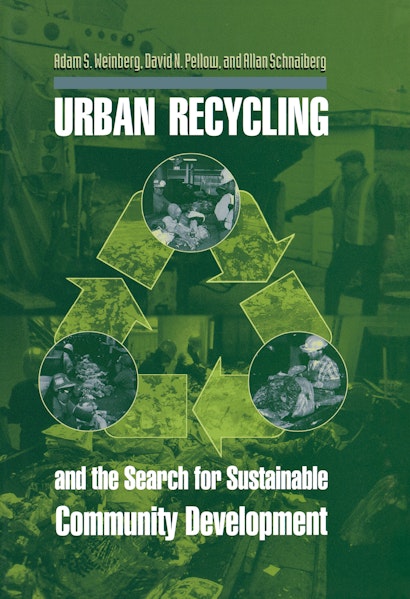More Americans recycle than vote. And most do so to improve their communities and the environment. But do recycling programs advance social, economic, and environmental goals? To answer this, three sociologists with expertise in urban and environmental planning have conducted the first major study of urban recycling. They compare four types of programs in the Chicago metropolitan area: a community-based drop-off center, a municipal curbside program, a recycling industrial park, and a linkage program. Their conclusion, admirably elaborated, is that recycling can realize sustainable community development, but that current programs achieve few benefits for the communities in which they are located.
The authors discover that the history of recycling mirrors many other urban reforms. What began in the 1960s as a sustainable community enterprise has become a commodity-based, profit-driven industry. Large private firms, using public dollars, have chased out smaller nonprofit and family-owned efforts. Perhaps most troubling is that this process was not born of economic necessity. Rather, as the authors show, socially oriented programs are actually more viable than profit-focused systems. This finding raises unsettling questions about the prospects for any sort of sustainable local development in the globalizing economy.
Based on a decade of research, this is the first book to fully explore the range of impacts that recycling generates in our communities. It presents recycling as a tantalizing case study of the promises and pitfalls of community development. It also serves as a rich account of how the state and private interests linked to the global economy alter the terrain of local neighborhoods.
Adam S. Weinberg is Assistant Professor of Sociology at Colgate University and coauthor of Local Environmental Struggles. He has advised many communities, nonprofit organizations, and government agencies on sustainable development. David N. Pellow is Assistant Professor of Sociology and Ethnic Studies at the University of Colorado at Boulder. He has published widely on environmental racism and justice, participated in several federal initiatives, and served on the board of many nonprofit organizations. Allan Schnaiberg is Professor of Sociology at Northwestern University and a faculty associate of its Institute for Policy Research. His numerous publications include The Environment: From Surplus to Scarcity and Environment and Society: The Enduring Conflict.
"[This] important book ostensibly concerns urban recycling, but it actually treats the paradox of sustainable community development in the age of global capitalism . . . [It] has important implications for social, community, and environmental advocates, and for students of contemporary urban life."—Choice
"Urban Recycling makes a refreshing change from the usual waste-management books with their worthy but often dull descriptions of the waste hierarchy and bottle banks. . . . This text, an analysis of United States community recycling programmes, has a different approach, with emphasis on community rather than recycling."—Jane Powell, Times Higher Education Supplement
"A sophisticated examination of recycling. . . . Urban Recycling presents readers with a holisitic study that will illuminate the history of recycling while examining the problems of achieving sustainability within a profit-driven economic system."—Brett Clark, Organization and Development
"The next time you finish that can of pop, you might want to just chuck the empty in the street. This is not the conclusion, but it is the implication, of Urban Recycling. . . . [T]his book is a great read for anyone inside or outside academia wondering what to do with that empty pop can."—Randy Stoecker, Contemporary Science
"This book represents a ground-breaking attempt to understand an important emerging dimension of the American economy. It will have a considerable impact on the way social scientists understand sustainable development initiatives. . .The recent travails of New York City in trying to find a new home for its garbage suggest that the phenomena examined in this book have an enduring practical significance for most Americans in metropolitan areas."—Thomas Rudel, author of Situations and Strategies in American Land Use Planning

